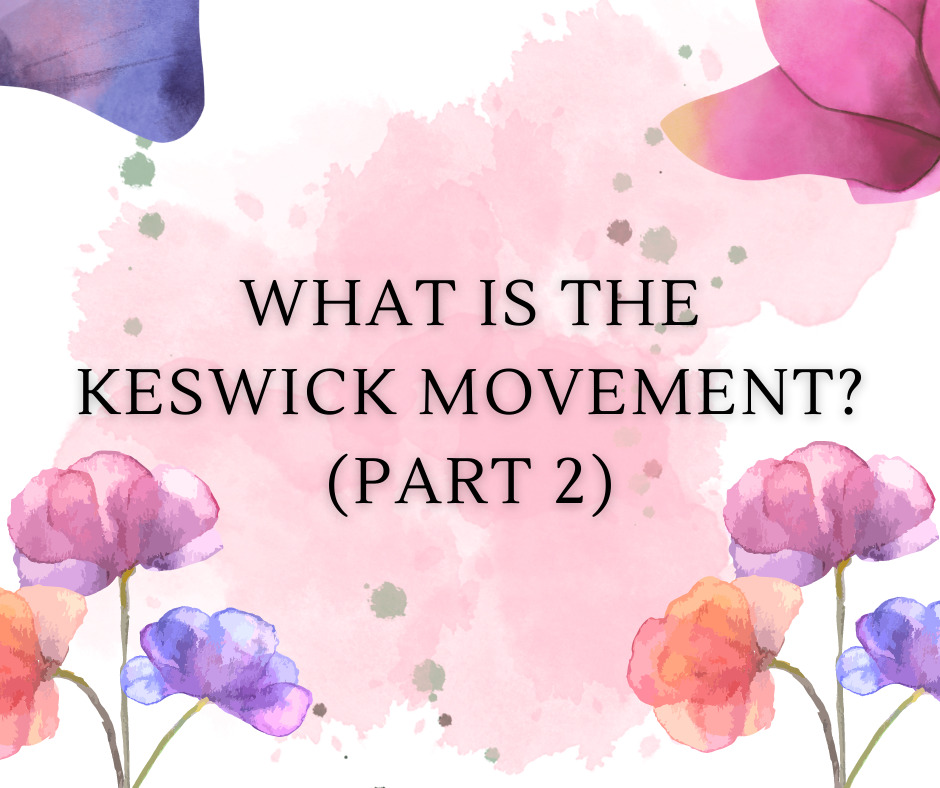In my previous blog (see here), I spoke about the history of the Keswick movement. Keswick theology is concerned about Christian living. Those in the movement have a desire to live godly lives. They want to please God. In this blog I want to address the positive teachings of the movement as well as the negative. Perhaps it would be better to say I am discussing those parts of it with which I am in agreement and those areas with which I am not. Here, I am concentrating on the traditional Evangelical expressions of the movement and not the connection it has with the theology of Wesley or Pentecostalism. Related to these things is how the movement agrees or disagrees with Free Grace theology. As mentioned in the previous blog, it must be kept in mind that not all adherents of Keswick theology agree on all points. The comments here are addressed to the generally held views.
There are a number of positive aspects of Keswick theology. First, it rightly separates justification (receiving eternal life) from sanctification (Christian living/growth in becoming more like Christ). One can be justified but not live godly. This agrees with Free Grace theology.
That leads to the second positive point. Keswick theology recognizes that many Christians are carnal. When we see a carnal person, we cannot say that person is not eternally saved. This agrees with Free Grace theology.
The third positive point is that it maintains that the believer has a choice. He can walk either according to the flesh or according to the Spirit. The decision to live godly falls under the realm of free will. God does not force believers to grow in Christlikeness. It is not automatic. This agrees with Free Grace theology.
The fourth positive point is that it teaches that victorious Christian living can only be lived in the power of the Spirit. Keswick adherents would more likely say it is done by their union with Christ. In any event, Christ is the only One that can produce spiritual fruit. This agrees with the majority of conservative Evangelical views of sanctification.
However, Keswick theology emphasizes this Biblical truth more than most. It maintains that keeping the commandments in our own power, relying on our own strength, leads to Christian failure. We can see many Christians doing what appears to be good works, but they are not pleasing to God because they are not done in the power of the Spirit. Works can be done in a legalistic way, a ritualistic way, in the power of the flesh. This would include things like the spiritual disciplines, like prayer, fasting, and Bible study. This was the experience of the great missionary Hudson Taylor, according to his testimony. It was only when he surrendered everything to Christ that he grew spiritually. The idea that Christians can do “good” legalistic work of no spiritual value agrees with Free Grace theology.
Keswick theology rightly maintains that not all believers abide in Christ. Not all believers are filled (controlled) by the Spirit. Only those believers who abide in Christ will experience the abundant life of John 10:10. Free Grace theology agrees here as well.
With almost all these positive aspects, it can be assumed that Lordship Salvation and Calvinism would disagree and take the opposite view.
There are some negative aspects of Keswick theology with which most (sometimes all) Free Grace would not agree. The first is that Keswick adherents do not see assurance of eternal life as the essence of saving faith. In their view, the second work of grace will cause the believer to grow in assurance as he abides in Christ.
The second area of concern is that the movement is very devotional and mystical. It crosses different denominational lines for that reason. There is not an emphasis on doctrine. The second work of grace is very experiential. This raises concerns among many.
A third area of disagreement would be the idea that sanctification begins with an emotional crisis. Keswick sanctification demands an encounter with the Spirit/Christ, just as at salvation. But does it need to be that dramatic? Can’t a believer realize from the study of Scripture that he needs to walk by the power of the Spirit, and can’t he simply see the wisdom of doing so? Must he seek some kind of emotional experience, and does this experience validate the reality of this second work of grace?
Related to this area of disagreement is the fact that sanctification is not determined by a one time crisis. We may decide to walk by the Spirit and do so for a period of time and then quit doing do. We can then decide to walk on the path of discipleship later. It is difficult to see in the Scriptures that a single event in one’s life is the determinative issue.
A fourth problem concerns the passive nature of sanctification that Keswick theology promotes. A common phrase used is “trust, do not try.” Growing in Christlikeness is seen as simply giving everything over to Christ. But doesn’t Jesus command us to take up a cross daily to follow Him? Yes, the victorious Christian life can only be done in His power, but we must decide to walk that path with Him. We must decide to make sacrifices for His name. Walking with Christ is not a life where we play no role.
A fifth area of concern is that some traditional adherents use the phrase “second work of grace.” This is the same terminology that Pentecostals use to refer to a post-justification baptism of the Spirit and speaking in tongues. This phrase is not in the Bible and causes confusion.
Finally, many Free Grace folks see the Scriptures as playing a key role in sanctification. As we read the Scriptures, we see Christ and understand what He desires of us. We then ask the Spirit to produce that obedience/fruit in us. Keswick theology seems to downplay the role of sound doctrine (and the role of the Scriptures?) and replaces it with an experience with Christ or the Spirit.
As already mentioned, not all those who claim to be followers of the Keswick model of sanctification agree on all points. There are those who agree with certain aspects of the model (perhaps the positive statements above) and disagree with others (for example, the negative aspects discussed here). Those who say they are “Keswickian” come in many different stripes. I believe most Free Grace people would say they agree with part of it and disagree with others, even if their list is not exactly the same as mine.





